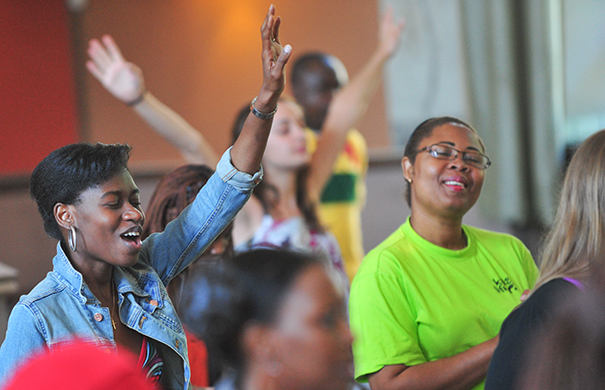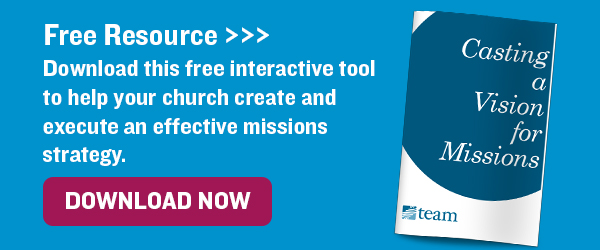
Sending Churches
4 Ways to Unite Your Local and Global Missions Strategy
January 25, 2018
by Anna Price

“You will receive power when the Holy Spirit has come upon you, and you will be my witnesses in Jerusalem and in all Judea and Samaria, and to the end of the earth.”
Acts 1:8 is a common verse in the missions world, used to encourage every Christian to take the Gospel to their Jerusalem (local city), Judea and Samaria (region), and the ends of the earth (world).
But with limited time and resources, this mission can seem like more than we can handle. Churches often start asking, “Should we focus on local or global missions?”
In answering this question, many churches decrease their global impact, fulfilling only part of the command God gave to take our witness to the nations, and dividing the world into unhelpful us vs. them categories.
How do we combat this? Read on to find four ways we’ve seen churches reach here AND there to make a deep impact in bringing hope to the nations.
1. Remember our mission is given by an infinite God.
This question is born out of a practical need — as finite beings with limited resources, we can choose between local or global ministry out of fear that we can’t do both. But this mindset forgets Who we serve.
The mission laid out in Acts 1:8 cannot be completed with our resources alone. It requires belief that the One who has given us this mission will equip us to fulfill it. It requires a reliance on the Lord as we seek to fulfill what He has called our congregation to do. It requires faith that God will provide the time, the people and the finances needed to share the Gospel near and far.
“Our missionaries shouldn’t be the only ones having to step out in faith,” says Steve Beirn, author of Well Sent.
So how are we, as the Church, walking in faith to discern what God is calling us to?
2. Connect your global missions strategy to your local missions strategy.
This is perhaps the most helpful move we’ve seen many churches take to destroy the here or there mentality. Explore what God has enabled your church to do in your local community. How have you impacted the people in your neighborhood?
Once you’ve defined how God has specifically equipped and unleashed your church locally, search for ways to share impact with other people groups and countries.
For instance, if your church focuses on creating a community where everyone feels welcome, search for global ministries and missionaries your church can partner with to help refugees in Europe feel welcome in their new country.
Or maybe your church is just blocks away from a local university, and your congregation loves to see students come to know Christ in a personal way. Your church could partner with ministries like NorteVerdadeiro to reach the future leaders of Europe through a community center and church plant near one of the largest universities in Portugal.
Looking to define your church’s missions strategy? Check out our free resource, Casting a Vision for Missions, that guides your church leadership through creating and executing a strategy.
3. Explore the demographics of your city and region.
As God brings the nations to our doorstep like never before, it is important to understand the changing demographics of your city and allow that to inform your missions strategy. Use websites like Data USA to search your city and find out what countries are represented therein.
Chances are, you’ll find there is an unreached or unengaged people group represented in your city, or close by. What would happen if your church intentionally engaged that people group?
One church found there was a high population of undocumented immigrants from Mexico and El Salvador in their neighborhood. As a part of their local outreach strategy, they began an ESL and citizenship class, building relationships with the students in order to share the Gospel. One of those ESL students became a Christian and began planning to plant a church in his hometown in Mexico, sent and supported by the church.
Another church discovered they lived in an area with a high population of Urdu speakers. They began to pray weekly for the Urdu speakers in their area, including specific cultural facts and prayer requests in their church newsletter. Soon, church members began noticing the Urdu speakers around them and started building relationships with the people for whom they’d been praying.
Eventually, a few members found they loved the Indian Urdu speakers they had befriended and decided to continue the church’s local impact by serving globally in India.
4. Learn from your missionaries.
Your global missions partners have a lot of insight to add when it comes to your local missions strategy. They have likely begun a ministry program from scratch, learned how to transition an everyday conversation to spiritual matters, and made friends with people from other cultures and backgrounds.
Your missionaries can share what they’ve learned with your congregation, by sharing ways they’ve shared the Gospel with their neighbors. They can tell you the best resources to use when starting an ESL class, or tell you how they’ve struck up conversations in the grocery store line that led to friendships.
Your church and your missionaries have the same goal: to see more people come to saving faith in Jesus Christ, so it makes sense to equip one another for the mission.
We hope these tips help your church reflect on your local and global missions strategies, and the ways the two can connect. As we each seek to live on mission locally and globally, let’s continue to pray God will move near and far, here and there.
Learn more about creating a missions strategy for your church here.
Related articles


